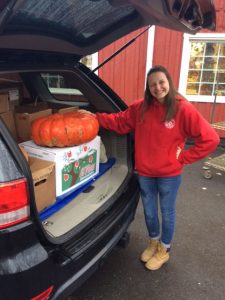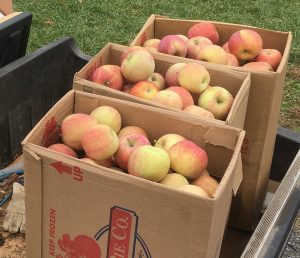Farmers, it Pays Not to Waste Food!

The Farm Food Donation Pilot Program (SB 416), signed into law by Governor Larry Hogan last fall, allows eligible farmers to take a tax credit of up to $5,000 per year for donating fresh produce to charitable organizations. This three-year pilot program that began in 2017 is available to farms located in Montgomery County as well as Anne Arundel County, Calvert County, Charles County, Prince George’s County and St. Mary’s County.
“This is a way for Maryland farmers to future help their communities and ensure their harvest does not go to waste,” said Governor Hogan.
While tax deductions reduce the amount of taxable income, tax credits reduce the total amount of tax owed. The tax credit helps farmers cover the cost of harvesting, packing, and transportation. They can take 50% of the value of conventionally grown produce donations and 75% of the value of certified organic produce donations, up to $5,000 per year. Weekly values of produce and certified produce are published by the State Secretary of Agriculture.

Butler’s Orchards has been a generous CFR food donor. Now they are helping to make receiving a farmer tax credit easier for all eligible producers.
Supporters in the state legislature hope that if farmers take advantage of this credit, they can expand this incentive to all Maryland counties. However, according Karen Kirksey, at the Maryland Department of Agriculture, which administers the program, so far no farmers have applied for the tax credit. Tyler and Ben Butler, third generation farmers of family-owned Butler’s Orchards, wanted to know why.
Butler’s Orchard has been a generous donor of surplus produce—including donating 5,583 lbs. through the CFR network to several of our network food assistance organizations. Last winter, Tyler and Ben met with legislators and Department of Agriculture staff in Annapolis to discuss the implementation barriers that have kept farmers from taking advantage of this program.
They point to one stumbling block—the reporting requirements to claim the tax credit. Non-profit organizations that receive donated produce can become State Certified Tax Credit Administrators to certify farmer donations. Ben and Tyler solicited ideas from staff at Manna Food Center, Community Food Rescue and DC Central Kitchen on ways to streamline reporting. For example, the law required each non-profit to use a state-certified scale (calibrated quarterly) to weigh all the produce. If CFR had to direct very perishable produce to a central location for weighing then transport it again for donation, not only would this be a logistically difficult and costly process, but the delay in delivery could render much of the produce unfit for human consumption.

Standard volume measures make it easy to convert each fruit or vegetable to weight for tax credit reporting.
Instead Manna staff suggested, and the state agreed, that produce could be placed in standard-sized containers and its weight determined using conversion tables. For example, a bushel of apples weighs 48 lbs. and a bushel of spinach weighs 18 lbs. As soon as Manna and CFR become Certified Tax Credit Administrators, we will promote the program and be ready to certify farmer donations this coming growing season. The clock is ticking and farmers only have two more years of this pilot tax credit program. If successful, the program could become permanent and expand statewide. However, if farmers don’t claim their tax credits—even if they donate surplus produce, the tax credit could end. And that would be a waste for everyone!

